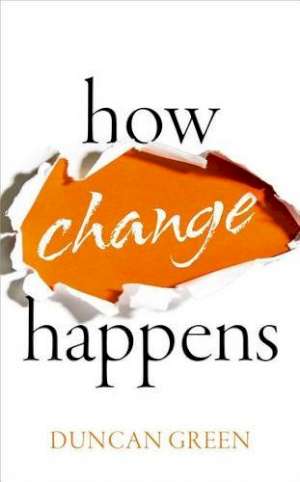02 March 2017
How Change Happens
Duncan Green
2016, Oxford University Press, 288 pages,
ISBN 978-0198785392
Reviewer: Vicky Pryce

The title of this book on poverty and development policies is an optimistic one. Change happens, says Duncan Green. The question, of course, is do things change for the better? At a time when the pubic debate is questioning the value added by the UK’s commitment to spend 0.7 % of its GDP on foreign aid, it is of paramount importance to understand how change happens and what types of interventions achieve the best outcomes.
The author of this book, Oxfam’s senior strategic adviser in the UK, has seen it all on the ground and draws from his extensive experience. But do not think for a moment that it is easy. Each situation is different; each community has its own idiosyncrasies; and no one size fits all. National governments, the population, donors and NGOs – and of course the private sector – all interact, have a role to play and are crucial in making change happen. Influencing them to do the right thing is paramount. But one needs to be flexible, use an iterative communication process and learn from it, and not slavishly follow simple checklists.
But international bodies have their own traditional ways of thinking and shift only slowly, to the despair of the activists. He cites as an example Martin Honeywell’s book, The Poverty Brokers, which described how the IMF used the Latin American debt crisis of the 1980s: “To impose austerity and ‘structural adjustment’ across the developing world. Growth was all; the state was always the problem, never the solution; deregulated markets the only way forward.” Duncan Green detects some softening in attitudes in recent years .
However the evidence suggests that very little has changed. See for example the recent treatment of Greece by IMF inspired policies after the financial crisis of 2008 and the economic and humanitarian crisis this has brought about and you would be excused for thinking that nothing much has moved in this area.
The author advocates a ‘power and systems’ approach to drive change on the ground, placing a lot of emphasis on national decision makers who are crucial in this. That may indeed be absolutely essential for further progress. To be effective, Duncan Green argues, international development organizations should accompany the ‘hard power’ they use to compel governments to change with ‘soft power’ to ensure that ideas and norms filter down a society’s structure and take hold in a way that adds crucially to the final outcome.
That may indeed be absolutely essential for further progress. In truth the jury is still out in this whole area. As the author himself points out, much of the poverty reduction we have seen in the world since 2000 owes very little to the UN’s Millennium Development Goal and its successor, the Sustainable Developments Goals agreed by institutions, governments and NGOs but a lot to the extraordinary growth in China which moved hundreds of millions of people out of poverty with more still to come. So in truth the jury is still out in this whole area.
